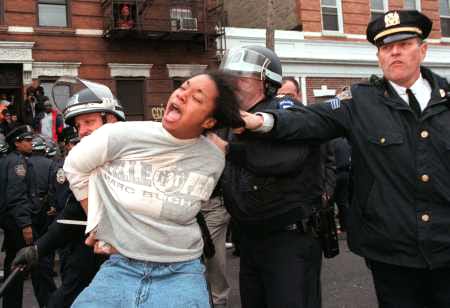NYPD forced to make 10 years of data public for the first time in racial profiling class action

This is the first time this data has been made publicly available. According to CCR’s report, it shows significant racial disparity in who is stopped and how they are treated, indicating the need for important reforms to the oversight of the New York City Police Department.
The report analyses nearly 1,600,000 NYPD stops of New Yorkers over a period of three and a half years. From 2005 to 2008, approximately 80 percent of total stops made were of Blacks and Latinos, who comprise 25 percent and 28 percent of New York City’s total population, respectively. During this same time period, only approximately 10 percent of stops were of Whites, who comprise 44 percent of the city’s population.
Results show that Blacks and Latinos are significantly more likely to be stopped by the police than Whites; that Blacks and Latinos are more likely to be frisked after a NYPD-initiated stop than Whites; and that Blacks and Latinos are more likely to have physical force used against them during a NYPD-initiated stop than Whites. Yet the rates of summons and arrests from all stops is not only extremely low, but nearly the same across racial categories.
“This is a watershed moment in our work to expose the NYPD’s unconstitutional policies and practices,” said CCR attorney Darius Charney. “The public and the New Yorkers who were subjected to more than 500,000 stops last year alone have the right to know the truth about stop-and-frisks. With this data and our report, the public can exercise its right to demand constructive change and an end to racially-biased policing by the NYPD.”
The report concludes the data “provides strong evidence that the NYPD is not only exceedingly indiscriminate in its frisks of Blacks and Latinos, but also conducts such frisks without reasonable suspicion, raising legitimate concerns that such frisks may be racially pretextual.” The report continues:
“The remarkably low rates of NYPD initiated stops-and-frisks that result in arrests, summons, weapons and/or contraband yielded make evident the ineffectiveness of this unconstitutional practice. In addition to the illegality and unconstitutionality of unwarranted stops, the racial disparity exhibited in the NYPD’s aggressive stop-and-frisk practices only serve to strain an already complex relationship between the NYPD and communities of color. The excessive use of physical force in nearly one out of four stops – particularly when the majority of stops-and-frisks of Latinos and Blacks do not result in arrest – promote continued mistrust, doubt and fear of police officers in communities of color already scarred by major incidents of police brutality.”
“Getting stopped repeatedly by the police in my own neighborhood on the way home from work is humiliating,” said David Floyd, a pre-med student at City College and one of the lead plaintiffs in the Floyd case. “I brought the lawsuit to make sure they don’t do this to other innocent people on the basis of race. The police have to be held accountable when they break the law, just like anyone else.”
On Jan. 31, 2008, CCR and the law firms of Beldock, Levine & Hoffman and Covington & Burling filed a class action lawsuit charging the NYPD with engaging in racial profiling and suspicion-less stop-and-frisks of New Yorkers. In April, CCR served discovery requests on the City seeking production of the NYPD’s stop-and-frisk data for the last 10 years.
According to CCR attorneys, the named plaintiffs in the case – David Floyd, Lalit Clarkson, Deion Dennis and David Ourlicht – represent the hundreds of thousands of New Yorkers who over the last several years have been stopped on the way to work, in front of their house, or just walking down the street, without any cause, primarily because they were men of color.
‘I brought the lawsuit to make sure they don’t do this to other innocent people on the basis of race. The police have to be held accountable when they break the law, just like anyone else.’
Police stops and frisks without reasonable suspicion violate the Fourth Amendment, and racial profiling is a violation of fundamental rights and protections of the 14th Amendment and the Civil Rights Act of 1964.
Copies of the report and the complete data are available at www.ccrjustice/stopandfrisk. For more information on Floyd v. City of New York, click here.
The Center for Constitutional Rights is dedicated to advancing and protecting the rights guaranteed by the United States Constitution and the Universal Declaration of Human Rights. Founded in 1966 by attorneys who represented civil rights movements in the South, CCR is a non-profit legal and educational organization committed to the creative use of law as a positive force for social change. Contact CCR at 666 Broadway, 7th floor, New York, NY 10012, (212) 614-6464, or www.ccrjustice.org.





